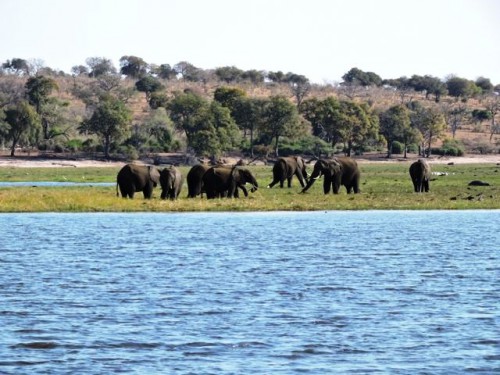I’ve always thought it better to write about an event, especially a successful one, a few weeks after it rather than risk getting caught up in the euphoria of the moment. So it is with considered reflection that I write about the success that was the Kasane Conference on the Illegal Wildlife Trade (IWT) which took place on 25 March.
There is little doubt in my mind that the Kasane Conference delivered beyond expectations. Thirty two countries plus the EU and nine International Non-Governmental Organisations met to review progress on the London Conference (February 2014) Declaration and agree on the Kasane Statement, the outcome document and main success of the Conference. The Kasane Statement contained fifteen new commitments for action on issues such as demand reduction, legal frameworks and deterrents, tougher law enforcement, sustainable livelihoods and money laundering.
Other successes that came out of the Conference included Uganda and Malawi signing up to the Elephant Protection Initiative and Vietnam confirming that it will host the third IWT Conference in 2016. And in a surprising but most welcome move, Botswana offered to host every second conference, an offer gladly accepted and one which cements Africa leadership in combating the Illegal Wildlife Trade, one of the most heinous of crimes. The Conference also called upon the UN General Assembly to address the issue of IWT at its 69th Session.
That the Conference managed to attract high level attendance was also telling. Those present included the President of Gabon, Vice Presidents of Namibia, Tanzania and Zambia and Ministers of 12 other countries, including China and Vietnam and the South African Environment Minister Edna Molewa. Senior representation from range, transit and demand states was exactly the participation we wanted to see. After all, there is no point in having a Conference that simply preaches to the converted. It is just a shame that, for various reasons, there was no participation from India, Thailand or any country from Latin America. These are countries that have an important role to play in combating the IWT.
And what made the IWT so special was the location that the Conference took place in. The iconic setting such as Kasane was a master-stroke, not least as it allowed delegates to see herds of elephants roaming freely on the banks of the Chobe River.
It would be remiss of me to end without recognising the role played by Botswana who, as we know it can do, delivered a highly successful event both in policy outcome and logistical terms. This was done in spite of significant organisational challenges and the postponement of the conference by three weeks makes the achievement all the more remarkable. The involvement of His Excellency President Khama demonstrated the real African leadership on this issue that the UK was looking for when we launched the IWT initiative in London in February 2014. Also noteworthy was the performance of the Minister of Environment, Wildlife and Tourism, Tshekedi Khama who chaired the meeting quite brilliantly with his usual mixture of straight talking and charm. There were certainly uncomfortable moments for some of the participants, but the Minister was right to insist that Kasane not be simply another talking shop. As a result, sensitive issues were aired and discussed, all put into stark context by Dr Mike Chase of Elephants without Borders who made an impassioned statement on why the IWT needed to be addressed. Most if not all were moved by his words and video presentation that showed the barbarity of poaching and helped set the context for the Conference.
It was a pleasure to be in Kasane and we should not underestimate the progress made. But, as with many issues, real success and progress will only be achieved with full and timely implementation of the commitments made. It is vital that the momentum started in London and driven by Kasane be kept going. The UK will do all it can to ensure that it does as I am sure Botswana will. I just hope that other countries, particularly those in the region, step up and match Botswana’s commitment and drive which comes, as it has to, from the very top.

